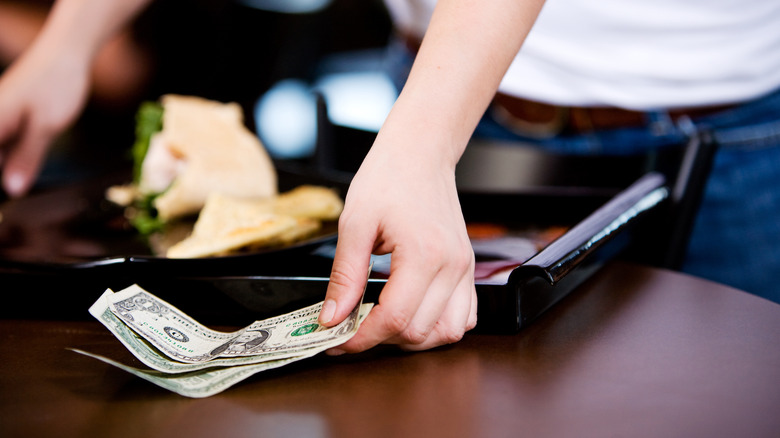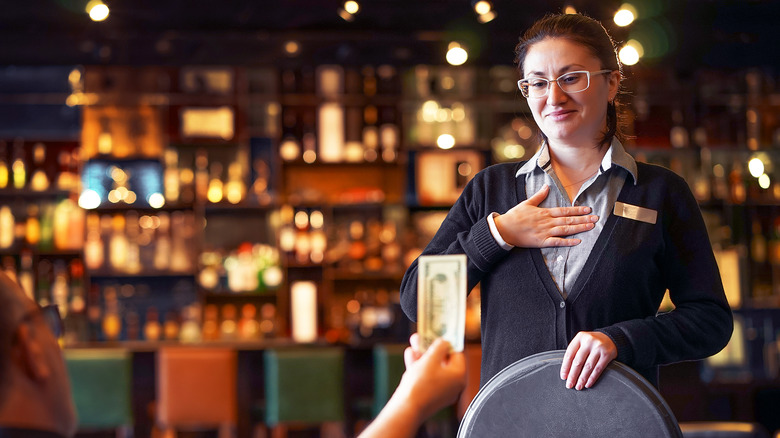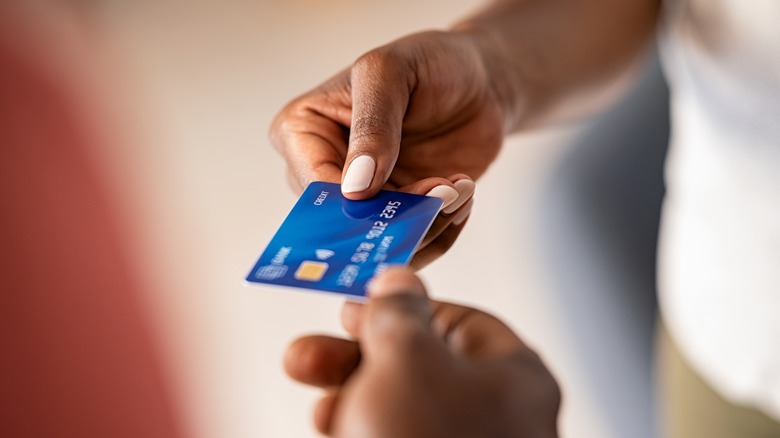Does It Make A Difference If You Tip With Cash Or A Credit Card?
Tipping culture is stronger than ever in America, since the restaurant industry is getting back on its feet post-pandemic. Modern restaurants are far more seamless and tech-reliant, with iPad cash registers and user-friendly mobile payment services like Square and Shopkeep. Tip jars have gone almost obsolete in the age of contactless payments, and yet the pressure to tip is stronger than ever, especially when a large prompt on a screen forces the customer to make a visible choice to tip a lot (20%), a bit (15%), a little (10%) or to not tip at all. There is an inevitably awkward moment where one feels obligated to tip no matter the level of service provided — a phenomenon Today calls "guilt tipping."
While there is no correct answer or any definitive guidelines on when and how much to tip, how you tip does make a clear difference. Tipping with cash or credit each has its own set of consequences.
Each restaurant has a different policy for cash or credit tips
The Bitchy Waiter, also known as Darron Cardosa, put the question of cash tips versus credit tips to his almost one million followers on Facebook and received over 3,000 impassioned replies. Cardosa reports for Food & Wine that "Everyone from servers to bussers to hosts, has a very strong opinion on tipping: cash is king." However, a $20 bill left on the table or in the form of the number 20 added to a credit card receipt won't necessarily go straight into the pockets of your server. The lifespan of a tip is mandated by restaurant policy. So, a cash tip of a $20 bill may get thrown into a communal pot and then divided later in one restaurant — resulting in less money for your server — but in another they might get the Andrew Jackson in its entirety that evening. Likewise, a $20 tip added on with a flourish of a pen may mean delayed payment or even have a percentage taken out of it, since some restaurants force their employees to pay credit card fees to receive their gratuities (per CBS News).
The pros and cons of cash tips
In some restaurants, they have an auto-gratuity policy added for larger groups, a predetermined amount that is automatically added to the bill, which has the upside of making tipping in bigger groups easier to handle. However, since 2014, auto-gratuities have been considered as "service charges," which means that for servers, these extra earnings are seen as regular wages and thus are taxable, per CBS News.
Cash tips have the benefit of being immediately accessible to your server, and they can also be a source of tax-free income if the server chooses not to report the earnings (via The Takeout). One more reason to tip in cash: some restaurants have a "tip out" expectation, where servers pass on the cash to other staff like dishwashers or bartenders who lent an extra hand during a particularly rough night. However, in an increasingly cashless society, some may view having to withdraw cash as a hassle. Another downside of cash tips: if they do go unreported, it may make claiming unemployment more complicated, since the true salary of a server is not reflected in paper records (per Food & Wine).
A server's advice for tipping on a credit card
If you've enjoyed a wonderful meal with incredible service and don't have enough cash to leave for a decent tip, leaving a larger tip on your credit card bill is far better than leaving a smaller tip with bills, writes The Salty Waitress for The Takeout. Even if there may be a fee a server pays on the credit card tip, some restaurants will "cash out" at the end of a night, leaving the server with extra cash at the end of a shift. Some servers may even prefer getting their tips on credit cards that will be added to their wages, since having cash at the ready may be a dangerous temptation to spend it all as soon as one's off the clock.
For savvy credit card users, there is a win-win situation for tipping generously on a credit card: the server gets to earn more, and the diner gets to collect more reward points. No matter how you tip, any server would agree that tipping generously will always be welcome, in cash or credit.



